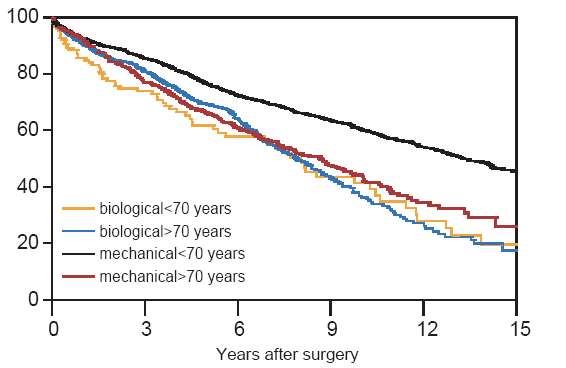Randy & Robyn
Well-known member
http://www.diva-portal.org/diva/getDocument?urn_nbn_se_uu_diva-5929-2__fulltext.pdf
The above link has some statistics that seem to contradict what I have heard to date concerning risks associated with mechanical versus biological valves. I hope I am not starting another firefight by posting this. I just found it interesting.
Specifically, on page 45, it states that embolism rates are lower for a mechanical valve than a biological regardless of age. I would have assumed this was due to the fact that more older people receive tissue valves and the rate of non-valve-related embolic events increases with age but this study denies that. If that is not the case, doesn't that tip the scales in favor of mechanicals concerning overall risk when you include resurgery?
Another very interesting statistic, also on page 45, states that the incidence of bleeding events in younger patients was equal among mechanical and biological valve recipients. This also contradicts what I previously thought was true. Does this even make sense?
The paper also correlates a higher bleeding risk with greater age which does make sense.
But if this were all true as well as the generalization that mechanical valves last roughly 30 years on average, wouldn't it be a viable plan to go with a mechanical at my age of 36 and, if it fails as projected, go with a tissue valve in my 60s that would then last the remainder of my life and at the age when anticoagulation complications are the highest? Kind of the opposite logic many people are using.
Is this a legitimate study and are my conclusions logical? Perhaps I am just, once again, reading more into a bunch of numbers than I should be.
Randy
The above link has some statistics that seem to contradict what I have heard to date concerning risks associated with mechanical versus biological valves. I hope I am not starting another firefight by posting this. I just found it interesting.
Specifically, on page 45, it states that embolism rates are lower for a mechanical valve than a biological regardless of age. I would have assumed this was due to the fact that more older people receive tissue valves and the rate of non-valve-related embolic events increases with age but this study denies that. If that is not the case, doesn't that tip the scales in favor of mechanicals concerning overall risk when you include resurgery?
Another very interesting statistic, also on page 45, states that the incidence of bleeding events in younger patients was equal among mechanical and biological valve recipients. This also contradicts what I previously thought was true. Does this even make sense?
The paper also correlates a higher bleeding risk with greater age which does make sense.
But if this were all true as well as the generalization that mechanical valves last roughly 30 years on average, wouldn't it be a viable plan to go with a mechanical at my age of 36 and, if it fails as projected, go with a tissue valve in my 60s that would then last the remainder of my life and at the age when anticoagulation complications are the highest? Kind of the opposite logic many people are using.
Is this a legitimate study and are my conclusions logical? Perhaps I am just, once again, reading more into a bunch of numbers than I should be.
Randy

























